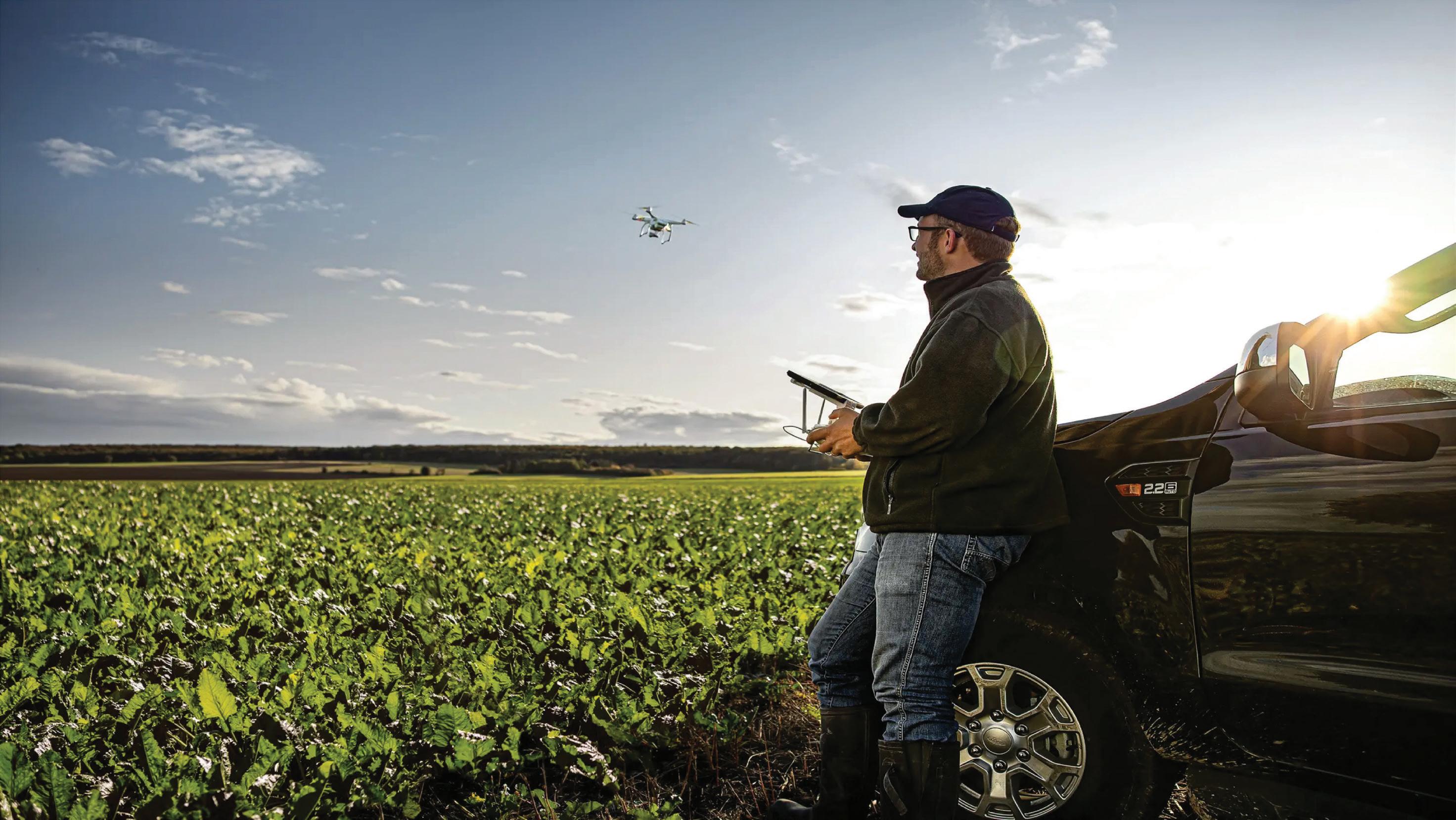
11 minute read
KWS PARTICIPATES IN GRAND FARM VISIONARY AGRICULTURAL INITIATIVE
TThe KWS group, with headquarters in Einbeck, Germany, announced participation in the Grand Farm Education and Research Initiative. The KWS Digital Innovation Accelerator (DIA) team has committed cultivation of five acres of experimental sugarbeets on Grand Farm to identify and develop sustainable farming practices benefitting sugarbeet, and in the future, all row crop growers. The Grand Farm initiative is designed to inspire collaboration among businesses, organizations and researchers to facilitate agriculture technology innovation. “All of us at DIA are pleased to be working with the Grand Farm on new agtech and precision farming initiatives,” Mike Boyher, manager of digital innovation at KWS, said. “Participation with Grand Farm supports DIAs mission to develop innovative, ground-breaking, farming tools and methods that improve the lives of our global farmers. Our objective is to ‘break’ current farming ecosystems to generate innovative ideas and learn from the results. Fields may not look pretty, yet those that are disease and pest infested will offer us the greatest insight as we further develop new breeding solutions and technologies that benefit our farmers. Working with the Grand Farm team supports this mission and really allows us to try KWS developed, innovative tools in a safe, secure environment.” On Thursday, June 30, Duane Bernhardson, Business Development Manager, KWS, spoke at Grand Farm’s Cultivate Conference on the topic of innovation at KWS. “As KWS becomes more visible and well known, it continues to make a significant investment in global farmers and agricultural technology. Through the KWS commitment to innovation, resulting in the cultivation of new precision ag tools, KWS is at the forefront of leadingedge technologies that will benefit the global farming community helping to secure food and feed for the future.”
The KWS DIA group has numerous projects underway that are at the forefront of precision farming. Additionally, the DIA team has focused on Smart Field Research, Automated & Connected Farm, Farmer of the Future, Seed to Table and Adapting to Climate Change. These focus areas have led the team to work in artificial intelligence, IoT, analytics, robotics, blockchain and aerial imagery. KWS is committed to these initiatives through continued financial support to this team of progressive, agriculturally focused professionals.
For more information, visit www.kws.com or follow them on Twitter®: @KWS_Group
About KWS

KWS is one of the world’s leading plant breeding companies with more than 6,000 employees in 70 countries. A company with a tradition of family ownership, KWS has operated independently for more than 160 years. KWS uses leadingedge plant breeding methods to increase farmers’ yields and to improve resistance to diseases, pests, and abiotic stress. To that end, the company invests approximately 15% of turnover in research and development.
Kratos Defense, Minn-Dak Farmers Cooperative Partner to Deploy Self-Driving Trucks to Address Workforce Challenges and Improve the Supply Chain
Kratos Defense & Security Solutions, Inc. (Nasdaq: KTOS), a leading national security solutions provider, announced that it has teamed with the Minn-Dak Farmers Cooperative (MDFC) to launch self-driving trucks, easing the truck driver shortage burden using Kratos Autonomous Systems to ensure integrity of the agriculture supply chain as a critical national security concern.
Kratos Unmanned Systems’ core competency is affordable, disruptive, unmanned systems-related technology and products for aerial drones, surface vessels, groundbased vehicles and related command, control, autonomy and artificial intelligence.
The Collaboration between Kratos and MDFC, one of America’s largest sugarbeet shareholder/ grower cooperatives, was fostered by Grand Farm, a non-profit group focused on facilitating agriculture technology innovation headquartered in North Dakota and combines Kratos’ innovative unmanned system technologies, with Minn- Dak’s agriculture and transportation expertise. The retrofitted solution adapts leader/ Follower” truck platooning for hauling harvested sugarbeets between piling stations and the granulated sugar processing plant in Wahpeton, North Dakota.


Maynard Factor, VP of Business Development for the Kratos Unmanned Systems Division, said, “We are excited to collaborate with Minn-Dak to deploy driverless trucks within their sugarbeet harvest operations. Kratos develops and fields transformative, affordable systems, platforms and products for national security, and ensuring the agriculture supply chain using driverless technology directly aligns with our core company objectives. Our focus here is on the niche, short-haul trucking routes where Kratos’ technology is available today that can solve driver shortage issues impacting agriculture hauling capacity and, therefore, the supply chain. Sugarbeet growers have been early adopters of emerging agriculture technologies, implementing now-commonplace innovations such as transitioning from rail to trucks and using GPS-guided farm equipment. We see driverless technology as a similar innovation for enhancing critical farm-related operations. Additionally, as the world advances and unmanned vehicle systems continue to solve a multitude of workforce cost and safety challenges, we are committed to being a significant solution provider across the spectrum of this large and growing market area.”
Self-driving truck deployments can augment the existing workforce as a tool for either increasing haul capacity to keep up with growing demand or maintaining existing haul capacity when qualified drivers are unavailable. Significant effort, cost and planning is required to ensure haul capacity meets national harvest quotas. Over 50,000 trucks a day can be deployed during peak sugarbeet harvesting season, and the Kratos Leader/ Follower platoon is an enabling technology that the agriculture industry can now use for optimizing the allocation of available labor to bolster the supply chain.
Mike Metzger, Minn-Dak Farmers Co-Op VP of Agriculture, said, “Minn-Dak is beyond excited to be partnering with Kratos Defense as we both take the next step towards implementing Kratos’ Leader/Follower technology. Our Cooperative’s goal is to take this technology to the next level by incorporating it into our commercial truck fleet that brings the sugarbeets from receiving stations to our factory for processing. It’s no secret that there is a gross shortage of commercially licensed truck drivers, especially in rural areas like ours. The deployment of driverless vehicle technology will undoubtedly help alleviate these labor shortages and improve the overall safety and efficiency of our fleet.”
Retrofitting driverless technology is an ideal solution for organizations like Minn-Dak that already have an existing fleet and logistics operations. It enables them to use their harvest trucks without having to invest in brand new “purpose-built” robotic vehicles. Additionally, the Kratos Leader/Follower platoon offers several advantages to logistics managers who can now pair available truck drivers with driverless trucks to enhance hauling productivity. The paired trucks offer greater efficiency and fuel savings while reducing recruitment costs and overall stress on the drivers, recruiters, and farmers by solving the driver shortage challenge. Additionally, the integration of technology into the agriculture supply chain offers strategic workforce development opportunities.
About Kratos Defense & Security Solutions
About Minn-Dak Farmers Cooperative
Kratos Defense & Security Solutions, Inc. (NASDAQ:KTOS) develops and fields transformative, affordable technology, platforms and systems for United States National Security related customers, allies and commercial enterprises. Kratos is changing the way breakthrough technology for these industries are rapidly brought to market through proven commercial and venture capital backed approaches, including proactive research and streamlined development processes. At Kratos, affordability is a technology, and we specialize in unmanned systems, satellite communications, cyber security/warfare, microwave electronics, missile defense, hypersonic systems, training, combat systems and next generation turbo jet and turbo fan engine development. For more information, please visit KratosDefense.com.
Minn-Dak Farmers Cooperative (MDFC or Minn-Dak) was the nation’s first farmer-owned sugarbeet cooperative and is headquartered in Wahpeton, a city in the southeast corner of North Dakota, in the heart of the Red River Valley. The Cooperative is owned by approximately 500 Shareholders/ Growers who collectively grow just over 100,000 acres of sugarbeets and is part of the domestic sweetener industry. Minn-Dak has proudly been in business since 1972 and processes its sugarbeets into sugar as well as products the likes of molasses and beet pulp pellets (used in animal feed). Minn-Dak's products are then marketed through agents worldwide. Major customers include industrial users, including confectioners, breakfast-cereal manufacturers, and bakeries. For more information, please visit www.mdf.coop.
Certain statements in this press release may constitute “forward-looking statements” within the meaning of the Private Securities Litigation Reform Act of 1995. These forward-looking statements are made on the basis of the current beliefs, expectations and assumptions of the management of Kratos and are subject to significant risks and uncertainty. Investors are cautioned not to place undue reliance on any such forward-looking statements. All such forward-looking statements speak only as of the date they are made, and Kratos undertakes no obligation to update or revise these statements, whether as a result of new information, future events or otherwise. Although Kratos believes that the expectations reflected in these forward-looking statements are reasonable, these statements involve many risks and uncertainties that may cause actual results to differ materially from what may be expressed or implied in these forwardlooking statements. For a further discussion of risks and uncertainties that could cause actual results to differ from those expressed in these forward-looking statements, as well as risks relating to the business of Kratos in general, see the risk disclosures in the Annual Report on Form 10-K of Kratos for the year ended December 26, 2021, and in subsequent reports on Forms 10-Q and 8-K and other filings made with the SEC by Kratos.
Notice Regarding ForwardLooking Statements

The Impact
of Soil and Crop Health in Agriculture
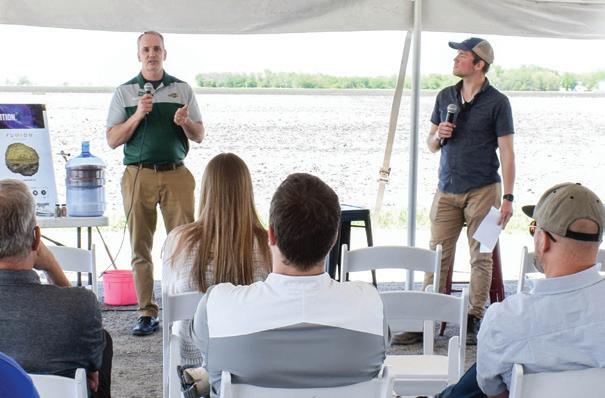

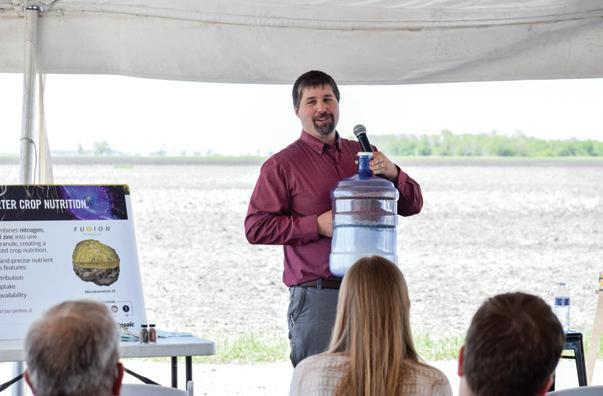
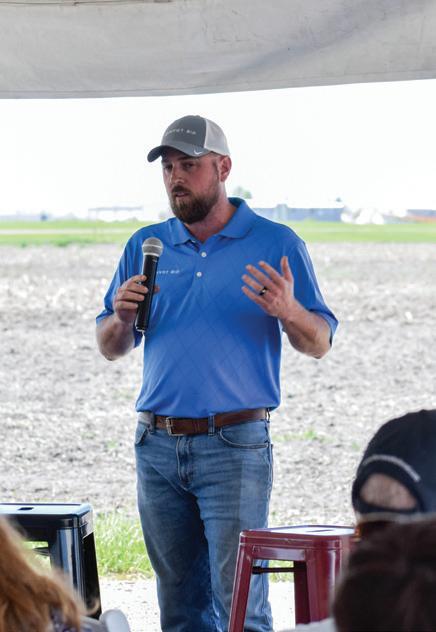
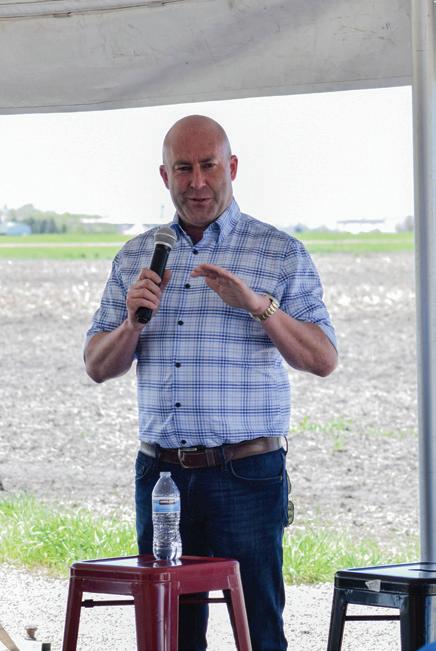
Healthy soil and crop practices are the lifeblood of not only the agriculture industry but how we will feed 10 billion people by 2050. As farmers face more environmental, regulatory, and consumer demands, managing for soil health to work with the land – not against it—and to reduce erosion, maximize water usage, improve nutrient cycling, and save money on inputs is more important than ever.
While farmers are often under a lot of scrutiny for agricultural practices, the reality is that every farmer needs to maintain healthy soils for the good of their own livelihood. At its recent Innovation Series, Grand Farm explored the latest in new fertilizers, practices, and technologies, and explored the work that’s happening to maintain strong soils and crops.
Grand Farm co-hosted the event with North Dakota State University and was co-hosted by Frank Casey, Director, School of Natural Resource Sciences, NDSU.
Some of the speakers included…
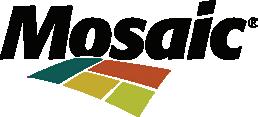
The Mosaic Company is the world’s leading integrated producer of concentrated phosphate and potash—two of the three most important nutrients in agriculture. They employ more than 13,000 people in six countries to serve farmers all over the world. The people of Mosaic work with the purpose to maximize efficiencies and minimize our environmental footprint. They strive to be a thoughtful and engaged neighbor, using our financial resources, expertise and innovative spirit to commit to good corporate citizenship.
Agveris works with progressive growers in ND, SD, MN and WI to help balance soils, maximize fertilizer efficiency and deliver higher profits. Computer-generated fertility recommendations are a great place to start, but because of numerous variables in the soil, they are inadequate for the progressive grower. Through the use of complete and accurate soil tests, field-tested recalibrated algorithms and other soil chemistry intricacies, they can deliver a fertility package that will bring the grower to the next level. By doing this, they are able to lower weed, insect and disease pressure, allow for better water utilization, more efficient nutrient uptake and availability, which gives the growers more flexibility of picking hybrids and varieties.
Jim and Darcy started in the custom farming industry in 2007, and Erickson Custom Operations was born. They originally helped farmers with planting, harvesting, and other types of field work. In 2014, ECO officially became an independent product dealer.
Primarily selling fertilizers (dry and liquid) in the upper Midwest, some former employees were met and ECO was introduced to Calcine products. A year later they were introduced to Aqua Yield products and started selling in the tristate area. ECO officially started with Calcine in 2015.
Pivot Bio was born out of an ambition to replace synthetic nitrogen fertilizer with a more sustainable and safer tool for farmers. Co-founders Karsten Temme and Alvin Tamsir began their work as lab partners during graduate school and focused on creating a dependable and safer way to fertilize cereal crops. Supported by early grants from the Gates Foundation in 2011 and driven by a relentless commitment to help make farming more productive and sustainable, Karsten and Alvin built a scalable proprietary tech platform that enables microbes to reliably produce nitrogen for cereal crops - a discovery that has been chased by scientists for decades, and never available commercially until now. Pivot Bio microbes take nitrogen from the air and make it available for plants, replacing the need for synthetic nitrogen.
After years of laboratory, greenhouse, and on-farm trials, Pivot Bio released its first commercial product for corn, Pivot Bio PROVEN®, to U.S. farmers in 2019. The product sold out within six weeks, demonstrating a strong demand from farmers for a new technology to improve their operations while minimizing their environmental footprint. Demand continues to grow, and the company expanded its product portfolio in 2020 with Pivot Bio RETURN® for wheat and introduced sorghum in 2021.







